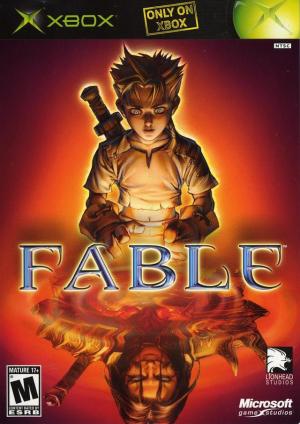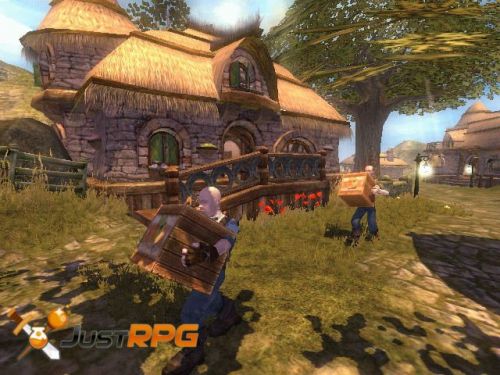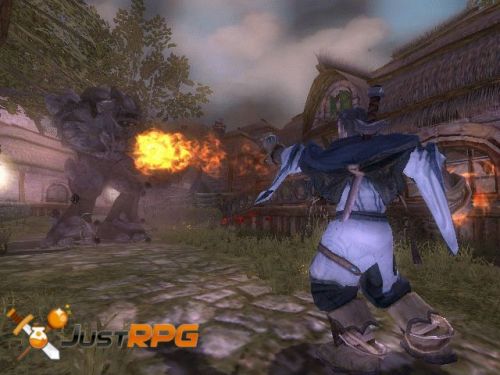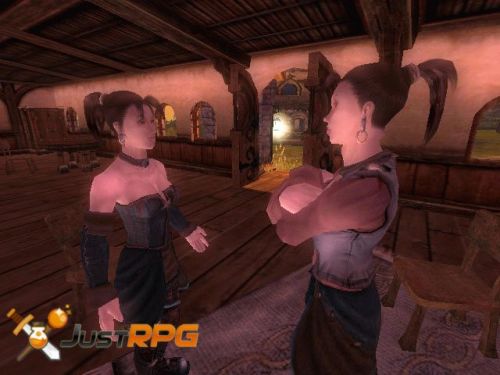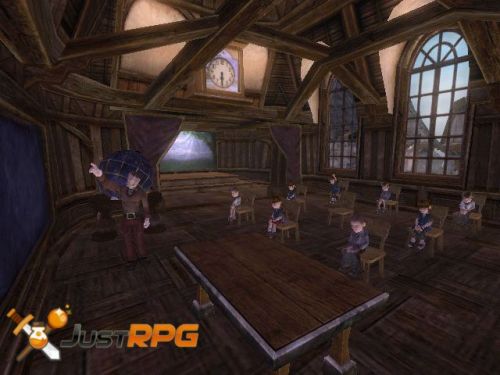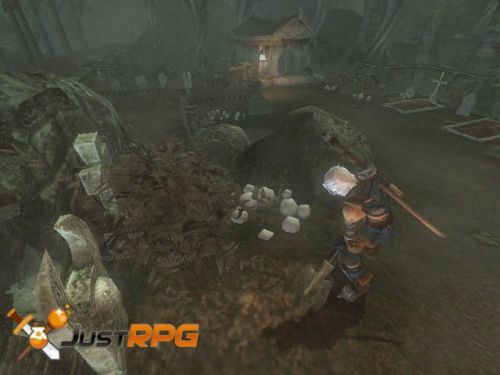Fable
Fable is an action-RPG originally released for the Microsoft Xbox. It follows the story of an orphan boy searching for the fate of his family. The game is filled with side quests in an open-world environment.
| Developer: Big Blue Box Publisher: Microsoft Games Studios Release Date: September 14, 2004 Platforms: Xbox, PC JustRPG Score: 60% Pros: +Combines Open-Ended Gameplay with a Good Story +Good or Evil Alignment System +Humorous Dialogue +Plenty of Side Quests +Original Combat System That Works Well Cons: -Bland Character Designs -Main Plot a Bit Short -Some Features Were Cut During Development |
Fable Overview
Fable is one of the premier Xbox action-RPGs whose success spawned several sequels. The game is set on the continent of Albion and players take control of an orphan who is raised by the Heroes Guild. The game has a central story revolving around the main character’s quest to uncover the fate of his family, but Fable also offers plenty of mini games. The open-ended nature of the game combined with its Good or Evil Alignment system have earned Fable much praise. The character’s appearance changes based on the actions players take in the world of Albion. Fable has sold over 2 million copies worldwide and continues to be a successful series.
Fable Screenshots
Fable Featured Video
[youtube]http://www.youtube.com/watch?v=LpnSLICwB7k[/youtube]
Fable Review
Whenever I think of brilliant ideas gone bad, I always flash back on a grainy old black-and-white film of one of the first helicopters. That particular machine did not feature rotating blades like modern helicopters. Instead, it had a large umbrella-like structure atop the chassis which went up and down very rapidly, resulting in a bumpy ride for the passenger and not much altitude.
Then, of course, we have the Edsel. And the story of Icarus. Ingenuity is not always guaranteed success. Often it is remarkable only in the spectacular way it flops.
Peter Molyneux is one such genius. Already famous for the legendary Populous and more recently Black and White, Peter believes in creating games that allow us to project our personalities and desires directly into the story. He wants us to play games where we write the script. On paper that’s a brilliant concept, especially for today’s mundane market of roleplaying games. What better basis for roleplaying than to actually allow the player to create his own role?
In practice, however, things haven’t turned out that well. Black and White certainly has its fans, but many of us found it to be repetitive and pointless – another RTS Sim but with your own pet animal. Our disappointment was drowned out by the crowds of Molyneux fans who were able to ignore its lack of deep gameplay. The aging gravitas Molyneux gained from the groundbreaking Populous still held sway. He’s been named to the Hall of Fame by the Academy of Interactive Arts and Sciences and one website called him “the Godfather of gaming”.
On paper, the newest release from Lionhead games, Fable, should rank with Populous as another groundbreaker. It was supposed to be the first genuine open-ended roleplaying game designed specifically for Xbox. As IGN’s review noted, it has been in development longer than the Xbox has been on the shelves. But it has gone through so many design revisions – most of which resulted in loss of features – that it bears no resemblance to the original concept. It’s gone from the original Project Ego concept envisioning a “living, breathing world that grows with your character” to today’s console Action-RPG hybrid delivering pretty much what you’d expect from any pedestrian console Action-RPG hybrid.
Your character’s appearance does change over time depending on how you play. But you have no choices as to gender or basic starting appearance. My sword-fighter had so many scars on his face by the end of the game I didn’t recognize him (a magic user would grow old prematurely). You can go anywhere in the not-very-originally named Albion from the moment you leave the training academy, but your chances of survival are not good if you stray too far. And during your travels you will see more loading screens than you will see new lands. You will find your path restricted as the area maps do not allow for aimless, random movement. You must either follow the road or … well, follow the road. The game even shows the bad guys on your mini-map in red so you can see where they are. Limited teleportation helps with some of the drudgery of travel but there will still be times when you have to fight your way back through areas you thought you’d already cleared.
The roleplaying features remaining in Fable are decent enough, if abbreviated. You gain cash, renown and items through quests. Skill points are allocated mostly according to how you play — Strength if you use a sword much (gaining experience gives you new sword moves), Archery will give you Skill points (bows and stealth, with an intuitive-feeling system which weights bow damage according to how far back you pull the string) and Will if you use magic (new levels yield better spells in three schools, including the Matrix-like “Slow Time” spell). While you will end up with a stronger character if you focus on one of the three areas, you are not constrained from mixing however you feel you’d like to play. One of the more annoying ideas for gaining experience has to be the “experience orb” – small green glowies that drop from vanquished foes and which will give you experience points. You can increase the number of experience points gained by chaining together multiple attacks with your weapon of choice, but you still have to run over the orbs with your character to collect them.
Property is also for sale in Albion – and you can increase the available lots by slaying the owners, if that’s your thing. If you can manage to purchase a store, you get a regular income from the merchant as well as discounts on his wares. Your guildmaster has a strange indifference to how many townspeople you’ve slaughtered or how many things you’ve stolen from people’s homes (the few that actually have working doors, that is). Being a cold-blooded murderer or a thief are acceptable choices.
Much of the focus of gameplay relies on how you are perceived by the computer-controlled citizens of Albion. Evil deeds and murder will make people afraid of you. Good deeds will make them adore you. Boasting about a quest before you embark can result in more cash and renown if you actually succeed in doing the quest unarmored or unarmed. Even your clothing has an affect – every piece of clothing and armor in the game has a “Scary” rating to it, and you can also change your hairdo and add tattoos. (Advice from a female, guys: If you want to lure a mate, avoid the mohawks and face tats, ‘K?) As you gain power you also learn new expressions such as “apologize” and “flirting” (which is invaluable for seducing your future bride or brides). While I’m sure the expression of flatulence will appeal to the younger male age group, it was only funny once. You can also gain more renown by showing off the trophies you collect – simply place the trophy on your D-pad and show it around town until everyone’s seen it.
Game controls are reasonable – as reasonable as they can be for the Xbox controller, that is. The black and white buttons will draw your sword or bow, respectively. The left trigger will lock onto a target. The right trigger will activate your magic, allowing you to fire a spell with one of the four action buttons (A, X, Y, B). If you want to master this much control, I suggest that you take your time in the training academy and accept the offers to redo the different trials. Otherwise, you’re likely to do as I did and accidentally punk innocent citizens who get in the way while you’re killing giant wasps. Or you’ll enlarge the mini-map in the middle of a fight and not be able to see what you’re shooting at. Most of you were not born with 10 thumbs like I was, however. You were warned.
Fable has aspects which recommend it – it is a technically well-done title within its limited scope. But replayability is restricted to changing your alignment between good and evil, as the quests will always be the same progression through the same restrictive play areas and the same NPCs and bad guys. Microsoft’s tag line, “For every action, a consequence” doesn’t apply to failed quests which come with an automatic do-over. Killing the quest NPC is one of those do-overs. The harshest criticism, however, is that the game is disappointingly short. Lionhead claims 50 to 100 hours of play to finish, but I and other friends managed to wade through it in under 20 hours – and that includes marrying between one and four wives, doing all the side quests and talking to all of the NPCs. The only way to spend more time than that would have been to sit in the tavern drinking and hearing the same canned NPC conversation over and over.
The result may be a shiny bauble of a new game, but under that thin veneer and Molyneuxite fan worship beats the heart of a truncated action title. Short on gameplay, long on flash. Short on true RPG depth and long on empty hype. It’s Black and White in new clothes, but by now some of us are finally realizing that Emperor Molyneux doesn’t really have any clothes, just great ideas that tend to die mysterious deaths during the process of development. I’m left feeling like that umbrella-helicopter pilot, slightly dizzy from the ride and disappointed that it never got as far off the ground as I was promised. If you want real open-ended roleplaying, buy the Xbox version of Morrowind. Fable just won’t deliver.
On a scale of 1 (worst) to 10 (best), Fable rates a solid 6, mostly for having the courage to at least try to break new ground. Woe, if they had only succeeded.
Fable Videos
Fable Official Trailer
[youtube]http://www.youtube.com/watch?v=LpnSLICwB7k[/youtube]

